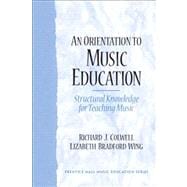
| Introduction | |
| The Context for Music Education | |
| Music and Music Education | |
| 21st Century Music Education | |
| The Musician Prepares to Teach | |
| The Present | |
| Music's Uniqueness | |
| The Two-Path Program | |
| Principles | |
| Music and the Total School Program | |
| American Society and Support for Schooling | |
| Equity | |
| Society/Culture | |
| Funding and Curriculum | |
| Leadership | |
| Who Makes Decisions? Guidelines for Decisions | |
| Partnerships | |
| Curricular Issues | |
| Forces that Bear Upon the Curriculum | |
| The Marketplace and Democracy | |
| Summary | |
| References | |
| The Educational Landscape | |
| The Educational Ecosystem | |
| The Educational Ecosystem at the Beginning of the 21st Century | |
| Milieu | |
| Reform | |
| School Choice | |
| School Governance and Management | |
| Restructuring | |
| Technology | |
| Desegregation | |
| Church/State | |
| School Finance | |
| Parents | |
| Welfare Reform and Adult Education | |
| Gender Issues | |
| Sexual Harassment/Child Abuse | |
| Subject Matter | |
| Standards | |
| Other Content Reform Efforts | |
| Core Knowledge | |
| Coalition of Essential Schools & Annenberg | |
| Character Education | |
| Assessment | |
| Students | |
| Enrollment | |
| Immigration | |
| Early Childhood Education | |
| Special Education | |
| Teachers | |
| Teacher Preparation | |
| Center for Educational Renewal | |
| Holmes Partnership | |
| Teacher Licensure | |
| The Educational Ecosystem in Retrospect | |
| Footnotes | |
| References | |
| The Significance and Process of Decision Making | |
| Findings from the Field of Education | |
| Psychological Foundations | |
| Piaget | |
| Vygotsky | |
| Brown | |
| Discovery Learning | |
| Bereiter | |
| Dweck | |
| Gardner | |
| Sociological Foundations | |
| Other Objectives of the Music Teacher | |
| Standards | |
| Standards for Arts Education | |
| Voluntary National Standards in Music | |
| The Required Music Program and the Elective Music Program | |
| The Core | |
| Teaching for Understanding | |
| Some Specific Objectives | |
| The Status and History of Objectives in School Music | |
| Philosophy | |
| References | |
| Organizing Instruction | |
| Writing Objectives | |
| Program Objectives | |
| Instructional Objectives | |
| Relationship with Assessment | |
| Plans | |
| Individual vs | |
| Group Objectives | |
| Group Objectives | |
| Individual Objectives | |
| Who Formulates Objectives? Top-Down Objectives | |
| Bottom-Up Objectives | |
| Curriculum Guidelines | |
| Funded Curriculum Projects | |
| The Real Curriculum | |
| Methods Courses and Objectives | |
| Individual Skill Objectives | |
| Individual Skills | |
| Taxonomies | |
| Musical Skills | |
| Skill Learning in General Music | |
| Musical Memory | |
| Skills and Scheduling Implications | |
| Sequencing | |
| Affective Objectives | |
| Related Objectives | |
| Process Objectives: Values, Decision Making, Performance, Problem Solving, Process Objectives | |
| The Performance Process | |
| Group Objectives | |
| Group Cognitive Objectives | |
| Group Affective Objectives | |
| Other Objectives | |
| References | |
| On Becoming and Being a Music Teacher: An Open Letter | |
| Looking in the Rearview Mirror | |
| Looking Around You | |
| Looking Ahead | |
| Moving Along | |
| Postscript | |
| References | |
| Table of Contents provided by Publisher. All Rights Reserved. |
The New copy of this book will include any supplemental materials advertised. Please check the title of the book to determine if it should include any access cards, study guides, lab manuals, CDs, etc.
The Used, Rental and eBook copies of this book are not guaranteed to include any supplemental materials. Typically, only the book itself is included. This is true even if the title states it includes any access cards, study guides, lab manuals, CDs, etc.